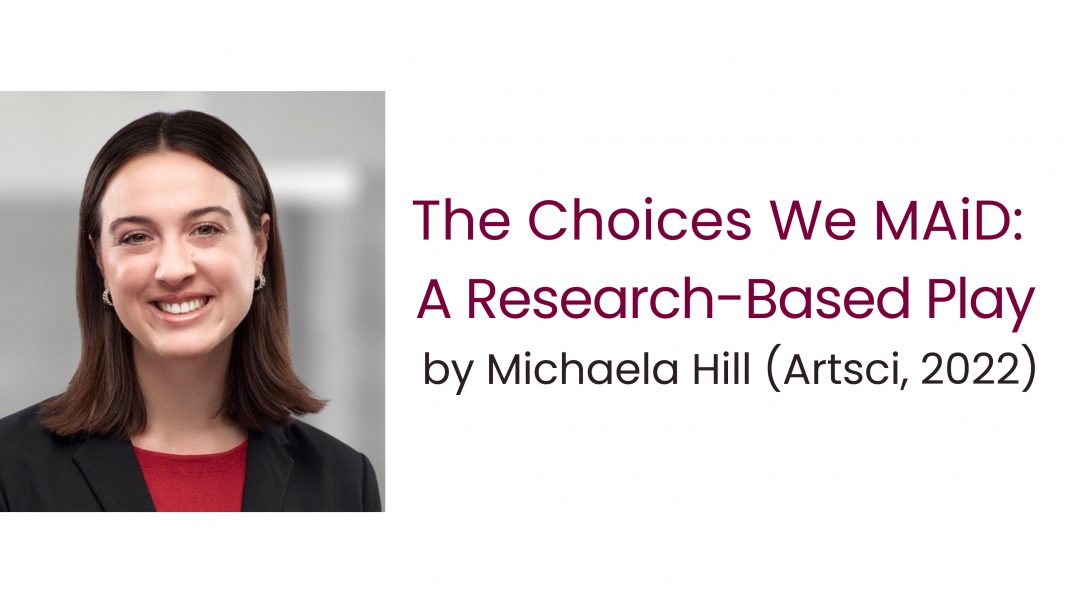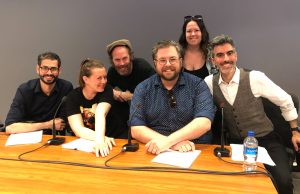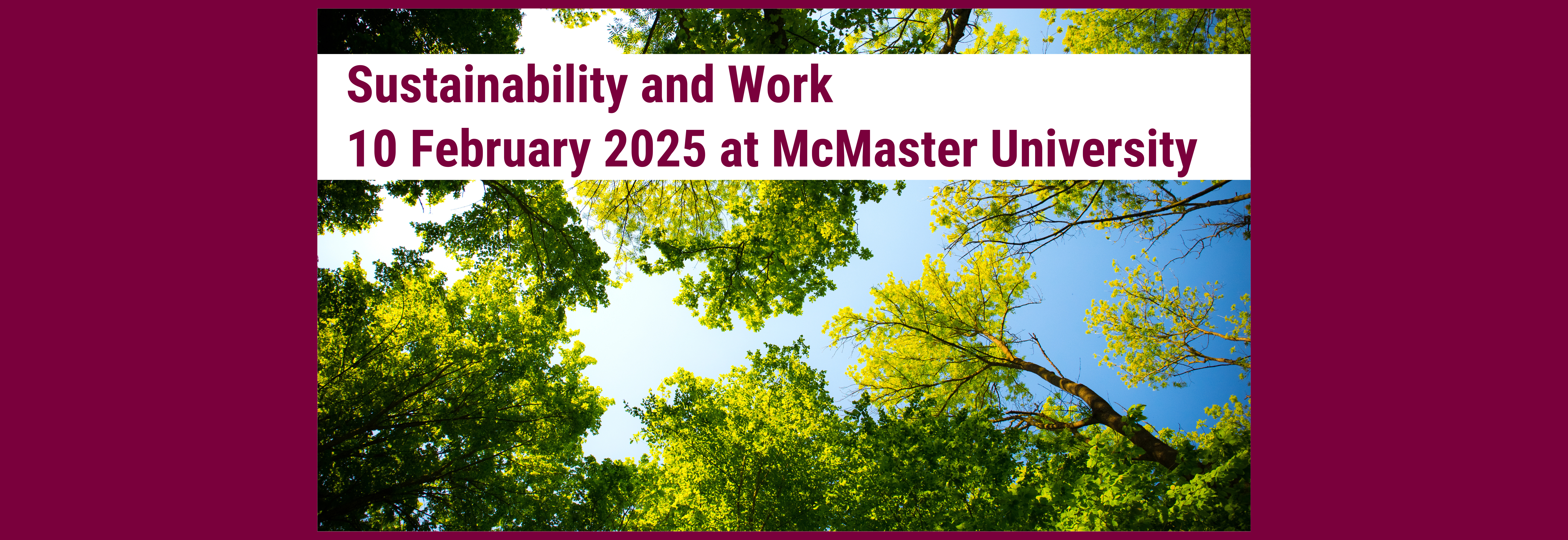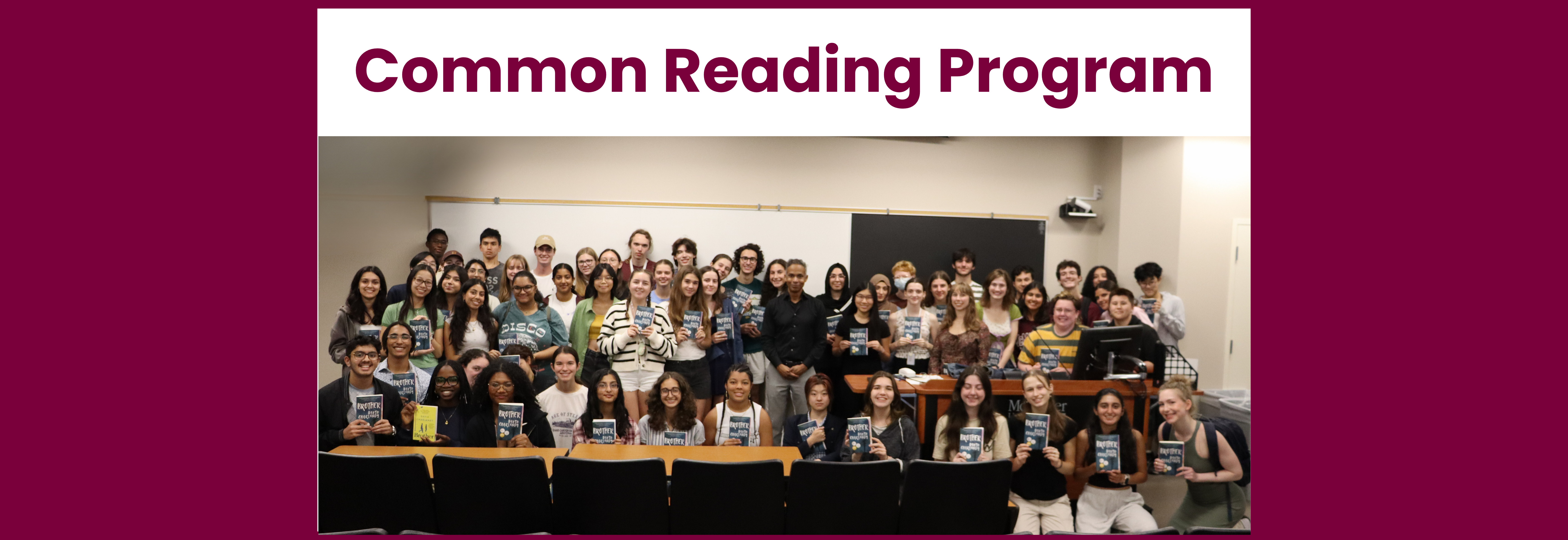Artsci Thesis performed at Dalhousie University Medical School

It all started in 2020, when then Arts & Science student, Michaela Hill (pictured right), took the Theatre Inquiry course with Professor Hartley Jafine and was introduced to research-based theatre for the first time. Michaela became fascinated with the power research-based theatre held to dissect complex problems in a way that conveys raw emotion and engages with numerous perspectives without requiring a succinct answer. At the end of the course, Michaela approached Hartley with an idea for her culminating Level IV Artsci thesis project, which would use research-based theatre to explore medical assistance in dying (MAiD) in Canada.
Hartley quickly came on board as Michaela’s supervisor, and the pair began to work on the project the following year, when Michaela enrolled in ARTSSCI 4C06 / Thesis. While researching MAiD legislation in Canada, Michaela soon discovered that Canada had made promises earlier in 2021 to allow people with mental illness to qualify for MAiD in 2023 (which has now been pushed to 2027). “This both fascinated and terrified me: in just over a year, people struggling with their mental health could be eligible for a physician-assisted end-of-life process,” Michaela said. This sparked many questions for her such as: What would this process look like? Who would qualify? How would they qualify? And who gets to make these decisions? These kinds of questions became the foundation of Michaela’s thesis project.
While Michaela was drawn to study MAiD as an important and timely issue, she also had a personal connection to this topic. In the six months before she started her thesis work, both of her grandfathers went through MAiD assessments. One grandfather decided that MAiD was the best option for him, and the other decided not to pursue it. “After both passed away within six months of each other, my family was left reflecting on each of their experiences and the different aspects of difficulty and beauty they created,” Michaela recalls. “This period of my life also highlighted for me how contentious MAiD can be within families and how much strife it can cause between family members, which helped inform the writing of a play that attempts to highlight the many different ways in which people feel about an assisted end of life process.”
Drawing on these experiences and on extensive research, Michaela ultimately wrote “The Choices We MAiD: A Research-Based Play” not to answer the many important questions that exist about MAiD, but to give other people the tools they need to find answers themselves.
Since Michaela completed her thesis in 2022, the government has twice postponed the introduction of mental health-focused MAiD legislation. “What I thought would be a relevant conversation in the year leading up to the new legislation has continued to be relevant and increasingly important, as medical experts, ethicists, and people with lived experiences continue to debate the complexities of pushing MAiD into this new realm,” Michaela notes.
Since graduating from the Arts & Science Program, Michaela has gone on to study law at Dalhousie University. Her work on what was initially her undergraduate thesis project has not ended, though. Being in law school has “helped strengthen my understanding of the law and policy-making world, and introduced me to new aspects of the MAiD conversation that I’ve continued to add to the play,” she notes.
In Spring 2024, nearly two years to the day after Michaela first shared “The Choices We MAiD” in her thesis presentation to the Arts & Science community, a cast of actors performed a staged reading of her thesis at the Dalhousie University Medical School. Arts & Science Instructor and Michaela’s thesis supervisor, Hartley Jafine, was among those on stage.

The opportunity to stage a reading of the piece was born when Hartley shared Michaela’s thesis with Dr. Wendy Stewart, a physician and Associate Professor in the Faculty Medicine at Dalhousie University. In January 2024, Dr. Stewart reached out with an invitation to perform Michaela’s thesis for second-year Dalhousie medical school students. Reflecting Michaela’s initial sense of the power and potential of research-based theatre, Dr. Stewart saw that a staged reading of Michaela’s work would provide medical students with an engaging and innovative way to explore this important and timely topic.
Reflecting on the performance, Michaela and Hartley hope it encouraged the audience to engage with a diversity of perspectives about MAiD, and left the second-year medical students reflecting deeply on the ideas raised in the script. “It was incredible,” said Hartley. “It was amazing to see and hear Michaela’s play brought to life. Michaela was such a special student to work with in the Arts & Science program and supervising her thesis was such a privilege.”
This isn’t the first time Michaela’s Artsci thesis has been shared with a wider audience. It has been showcased at several conferences, including a Canadian national conference in Health Humanities where she took home the 2022 Peterkin Brett-MacLean Student Prize for best student presentation. “I continue to believe her play needs to be performed and shared within medical education and the public,” said Hartley. “This is just the beginning of our journey – next step, full theatrical production!”
About “The Choices We MAiD: A Research-Based Play” by Michaela Hill, described by Hartley Jafine, Arts & Science Instructor and Michaela’s thesis supervisor:
The play is a dark comedy, a somewhat absurdist script, that does an excellent job of exploring the medical, ethical, and legal complexities of mental illness and MAiD, including if individuals with a mental illness diagnosis should be able to access MAiD, the notion of foreseeable death, if there should be criteria to accessing MAiD with a mental illness diagnosis (and what the criteria would look like), the fact that a small group of individuals will be making this decision for all Canadians, etc.
As Michaela writes in her thesis, each of the characters in the play is named after an important figure in Canadian legal history who brought court cases and advocated for the advancement of MAiD law.
The script is clever and thoughtful. It does an excellent job of exploring the medical, ethical, and legal complexities of the new, incoming legislation.
A Brief Summary of the Play, described by Hartley Jafine:
Gloria, a psychiatrist who sits on the panel establishing the criteria for mental illness/MAiD, is struck and killed on her way home from work (in view of her daughter). She awakes in the Dead People Place (the DPP), an after-life type place, where she gathers a group of individuals for a discussion to help her complete her life’s work. The group includes a character who died painfully before MAiD was a legal option and who had a child with mental illness, a character who died by suicide, a character who died by MAiD (accessed because of disability to due polio), and a character who just likes to stir the pot.
Alumni, Artsci, FacultyRelated News
News Listing

2025 New World of Work Series Event
Alumni, Events, Experiential Learning, Students
January 20, 2025

Students Reflect on New World of Work Event
Alumni, Artsci, Experiential Learning, Students
November 21, 2024

Author inspires Arts & Science students to tell their stories
Artsci, Events, Experiential Learning, Students
October 4, 2024
